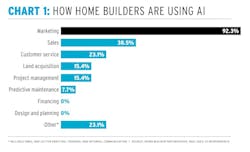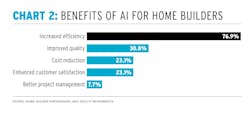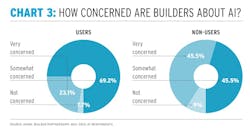AI in Home Building ... What Now? What Next?
Science fiction writer Arthur C. Clarke famously said, “Any sufficiently advanced technology is indistinguishable from magic.”
In many ways, that’s an apt description of today’s attitudes toward artificial intelligence, more commonly referred to as “AI.” Type a request into ChatGPT, arguably the most well-known AI chatbot, and in seconds it can spit out paragraphs of relevant content—a boon for academically challenged high school students faced with writing college-level essays.
But how can home builders use AI in new-home construction?ai for home buildersWhat is AI?
Simply put, AI attempts to simulate the human brain’s neural pathways and use machines to learn and think like humans. There is, of course, considerable concern about how dangerous AI could potentially be. But for home builders, what is available now can be a useful tool in enabling aspects of their business operations to be more productive and cost-effective.
There are two types of artificial intelligence: generative and predictive.
Generative AI uses machines to create original content such as text, images, and music. The ubiquitous ChatGPT, launched in November 2022, is a generative AI product from AI research company OpenAI that creates text. Graphic design suites, such as Adobe, now include AI, allowing users to alter photos and remove elements to create an improved image in seconds. Meanwhile, cloud-based customer relationship management (CRM) software company Salesforce has an AI product that works with its CRM system to write follow-up emails, generate texts, and so on.ai in home buildingPredictive AI, however, digs deep into Internet-accessible databases to find behavior patterns that can then be used to predict future conditions or behaviors. A good example is Arx City. A real estate web-site serving three metropolitan areas, Arx employs predictive AI to scan public databases of available real estate, local zoning and code regulations, and other databases and then applies that information to financial modeling datasets to allow users to predict returns on investment for different real estate properties under various development scenarios.
For example, can you get a 20% return on an awkwardly shaped infill lot by building attached single-family homes for first-time homebuyers? It may take several months for a land acquisition manager to find that answer (and perhaps you’ll lose out on the deal in the meantime). Arx City’s AI engine provides reliable analysis in mere minutes.
RELATED: Glossary: AI Terms Explained
3 Ways Home Builders Are Taking Advantage of AI
Right now, home builders are taking advantage of artificial intelligence in three main areas of their business:
- Marketing and sales
- Customer satisfaction
- Purchasing
1. AI for Home Builders: Marketing and Sales
Although AI could eventually affect almost every part of a home builder’s operations, it’s coming for marketing first.
In late November 2023, Pro Builder partnered with management and consulting company Shinn Builder Partnerships to survey about 400 builders in its network about their use of AI. Although just 37 builders responded, 35.1% reported using AI. And among those, 92.3% were using it for marketing.
Why marketing? With proper prompts, AI applications such as ChatGPT can generate on-point copy for ads, brochures, websites, and other texty content in seconds.
There’s a learning curve, of course. “The tool is only as good as the prompt,” says Genevieve Benson, director of business development at Milesbrand, a marketing and branding agency serving home builders. “Typically, it takes three prompts to get anything usable, but it’s like having a junior copywriter.”
The upshot is that using AI still requires expertise—something everyone currently using AI agrees on. ChatGPT won’t replace your marketing department, but it can make it more efficient by generating raw copy at a faster pace for the experts to edit.
“We chose to bring AI into our sales and marketing department before others because it was a low-hanging fruit,” says Miles Terry, sales and marketing manager at Terry Homes, in Kalispell, Mont. “It was also a lower risk and cost to implement.”
The Shinn survey asked home builders about the benefits of AI as well. The largest number of respondents identified increased efficiency (76.9%), improved quality (30.8%), and reduced costs (23.1%) as the main benefits.
Home builder use of AI on the sales side involves replacing human-monitored chatbots on builder websites with AI programs such as AtlasRTX, which quickly learn a builder’s processes, products, and branding language to reliably answer questions, provide information, and schedule appointments with online visitors 24/7—all without involving a human in those early interactions.
2. AI for Home Builders: Customer Satisfaction
Eliant, a research firm well-known in the housing space, surveys recent homebuyers and trade contractors to provide feedback to its builder clients to help identify areas for improvement and raise red flags for significant issues.
As part of its surveys, Eliant asks open-ended questions to learn more about what customers and trades think. Until AI came along, the only way to analyze that information was to read all of the comments word for word.
Not anymore. “With natural language processing, AI can do that legwork and summarize thousands of comments,” says Eric Mitchell, the firm’s VP of innovation.
Eliant is “training” ChatGPT to learn the firm’s extensive dataset and blend employee, trade, and customer feedback. It would then use that data to give builders more detailed information about areas for improvement.
RELATED
- Here's Where AI Is Making Inroads in Homes and the Housing Industry
- Managing With Data (or How to Get Your Processes to Talk to You)
- AI Resource Guide for Builders and Contractors
3. AI for Home Builders: Purchasing
That kind of large-scale data analysis will be a boon to home builder purchasing departments as well. Comparing pricing and cost data is labor-intensive. “We spend too much time trying to make our data as accurate as possible,” says Tony Callahan, an expert in purchasing and supply chain management for home builders and a regular columnist for Pro Builder.
The most common process, he says, involves someone poring over lengthy reports looking for the proverbial needle in a haystack. “AI could manage exception reports so purchasers only need to look at records AI thinks are wrong,” Callahan says.
He points out other purchasing tasks AI could improve for residential construction companies, such as contract management, demand planning, and material expediting. Having AI look for patterns across databases for each of those areas could identify errors. In addition, AI can handle repetitious, boring tasks such as filing reports.
AI for Home Builders: The Caveats
Early predictions of AI’s impact on all industries, specifically the job security of certain rank-and-file office workers, is a concern but one that has yet to be proven.
More likely, AI aficionados say, AI won’t take your job, but someone who knows AI will. The consensus is that subject-matter experts will be invaluable for optimizing these “magic” tools. For home builders, specifically, AI-generated material won’t meet their needs unless an expert is able to evaluate and direct it. “If we prompt AI for 10 names for a community, it spits out 10 very generic names,” Benson says. Humans still need to provide the creative ingenuity to get the answers they want and need from artificial intelligence.
AI is also developing a reputation for producing errors and hallucinations. Errors can originate when AI apps find factually incorrect information from a public database, blog post, or other online content source and regurgitate it as fact. Hallucinations, meanwhile, are AI inventions with no source to credit. An example would be if AI conjured a community called Broad Oaks for a builder marketing campaign where no such community exists.
Other caveats about adopting AI in home building include the significant legal issues associated with the technology and its use. Questions about privacy, for instance, are a major concern among home builders. In the Shinn survey, more than 90% of respondents said they were “very or somewhat concerned” about ethics and data privacy in AI applications.
In early 2023, OpenAI worked to address ChatGPT’s privacy issues by isolating users. “The blob of data being trained on the public internet is like its own animal,” says Barrett Davis, CEO and co-founder of HomeScribe AI, an AI-based sales and marketing service for the housing industry. “As you interact with ChatGPT, it now keeps your information as a little slice of the blob. That’s just for you. That wasn’t the case a few months ago until OpenAI changed ChatGPT to address a lot of its privacy concerns.”
Of course, such upgrades don’t eliminate privacy issues completely, and the inability to identify information sources can lead to charges of copyright infringement. It’s a thorny issue that’s working its way through the judicial system now.
The AI revolution is moving fast, probably faster than the growth of the Internet during the 1990s and with equal or greater potential to disrupt business and daily lives. Adaptable, quick-to-learn companies—home builders included—will be far better equipped to succeed in this new environment than those unwilling to investigate and integrate what AI has to offer.
Paul Deffenbaugh is a former contractor and an award-winning journalist who was been writing about the construction industry for more than 25 years. He can be reached at [email protected].
artificial intelligence in home building, using artificial intelligence in new-home constructio




